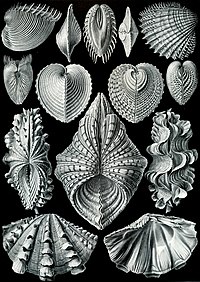
Photo from wikipedia
While ocean acidification (OA) effects on marine organisms are well documented, impacts of sediment acidification on infaunal organisms are relatively understudied. Here we synthesize CO2-driven sediment acidification effects on infaunal… Click to show full abstract
While ocean acidification (OA) effects on marine organisms are well documented, impacts of sediment acidification on infaunal organisms are relatively understudied. Here we synthesize CO2-driven sediment acidification effects on infaunal marine bivalves. While sediment carbonate system conditions can already exceed near-future OA projections, sediments can become even more acidic as overlying seawater pH decreases. Evidence suggests that infaunal bivalves experience shell dissolution, more lesions, and increased mortality in more acidic sediments; effects on heavy metal accumulation appear complex and uncertain. Infaunal bivalves can avoid negative functional consequences of sediment acidification by reducing burrowing and increasing dispersal in more acidic sediments, irrespective of species or life stage; elevated temperature may compromise this avoidance behaviour. The combined effects of sediment acidification and other environmental stressors are virtually unknown. While it is evident that sediment acidification can impact infaunal marine bivalves, more research is needed to confidently predict effects under future ocean conditions.
Journal Title: Marine pollution bulletin
Year Published: 2017
Link to full text (if available)
Share on Social Media: Sign Up to like & get
recommendations!